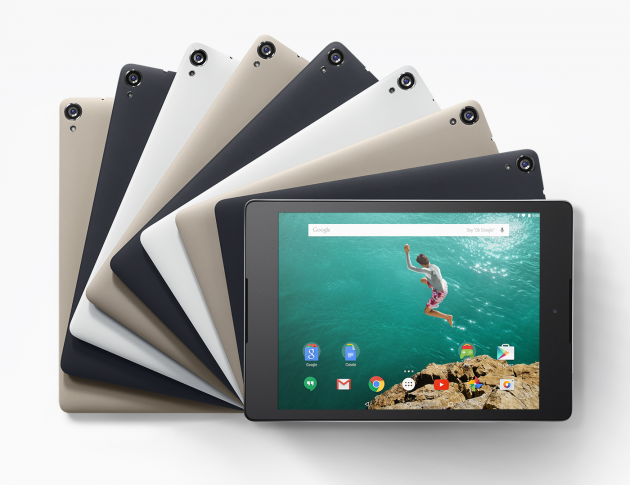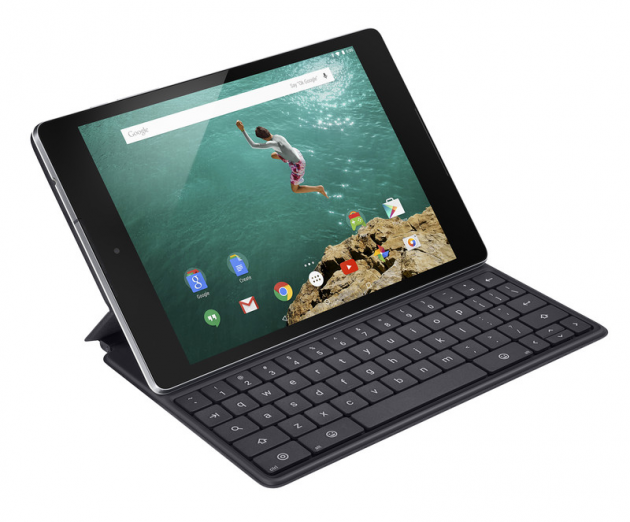Nexus 9 HD Tablet With Android Lollipop 5.0
Up until now, the Google Nexus has been a brand that the search giant has used in order to showcase the latest Android version using some modern hardware.
The hardware maker has varied from HTC to Asus with little consistency over the years but the bleeding edge technology has attracted buyers who enjoy using the “plain vanilla” Android mobile operating system before the device manufacturers have added their resource-hungry skin to the OS which often can make the device appear sluggish. Because of this, the Nexus brand has developed quite a following over time and with good reason.
Following the success of the Nexus 7 release, it has been several years between tablets. Google chose HTC to make their latest tablet. The Nexus 9 takes advantage of the popularity of the vanilla Android operating system while bringing some new design ideas to the table.
Display Changes
The new Nexus tablet represents a change in approach with the brand. Samsung has been busy offering widescreen tablets in a 16:9 or 16:10 orientation that look too slim and awkward to hold in portrait but have a lovely widescreen screen shape in landscape mode where movies looks wonderful if the display is a quality one, such as the AMOLED display on the Samsung Tab S 10.5.
This time around Google have opted for the same 4:3 orientation as the Apple iPad models. Ideal for reading of web content, ebooks and PDF files, but in landscape orientation leaving black letterboxing at the top and bottom of streaming widescreen TV episodes and digital movies during playback.
The IPS LCD capacitive touchscreen has 16 million colors and uses the same 1536 x 2048 pixels resolution as the iPad (it's basically the “Retina display”). The display size of the tablet is 8.9-inches which splits the difference between a smaller iPad mini and the iPad Air 2. The pixel density is slightly higher than the iPad Air 2 due to the smaller screen size with a 281 ppi pixel density. The display is covered in Corning Gorilla Glass 3 but lacks the anti-reflective coating of the latest iPad model which is clearer when using outside.
Bleed Issues With The Screen
Unlike with AMOLED displays, the back-lit LED screens can suffer from light bleed where the LED light source can show through the display in low light conditions. Sadly this has been noticed on many production models of the Nexus 9 tablet. Not a major issue, but the iPad lacks such problems in most cases and the Samsung Tab S doesn't have the problem because AMOLED displays are different technology.
Android 5.0
One of the major selling points of the Nexus 9 is for buyers to get hold of the new Android 5.0 (previously known as Android L because it is really Android Lollipop).
New smart phones from LG and the upcoming interesting Nokia N1 tablet to be released early in 2015 both offer the latest Android experience but the Nexus 9 has stolen the march once again with the OS.
A new pull-down tray with single and double pull down features offer more functionality than before. The lock screen can show notifications as they come in and updates to Lollipop since release have made it possible to avoid displaying not personally sensitive notifications if you don't want them to be seen by anyone who touches the tablet.
The GUI of the OS is designed to be extremely flat. With the Retina-matching display resolution it's really not necessary any longer to add gradients or shading to icons and backdrops, so the latest GUI reflects this. The movements are very fluid. There are a few occasional stutters here and there though. It is hoped that this is more an issue with apps that have yet to be updated to work with Android 5.0 and not so much a problem with the OS itself. Yet the NVidia Shield gaming tablet offers a smoother user experience running the same Lollipop release which paints a confusing picture.
Specifications
The Nexus 9 offers Wi-Fi only and 4G LTE models. Wi-Fi up to the latest ac standard is supported, DLNA for wireless screen broadcasting and the usual Bluetooth support. As is often the case with HTC models, there is no external micro SD card slot unfortunately, but 32 GB of internal storage is provided.
The casing is sleek and sexy on the back with the familiar Nexus branding. The tablet weighs in at 425 grams which is only just shy of the iPad Air 2 despite being 8.9-inches to the iPad's 9.7-inches. Therefore, the tablet feels a little more sizable than other mid-size tablets.
Powered by the NVidia Tegra K1 64-bit processor (a first for Android) with a Dual-core 2.3 GHz Denver and a Kepler DX1 GPU, it is a fast tablet that is only overshadowed by the performance of the latest Tri-core, 64-bit iPad Air 2.
One let-down is the lack of fingerprint sensor with the Nexus 9. Extremely popular as the Touch ID with the iPad and gaining acceptance with the Samsung Tab S, Note and S5 models, it is perhaps surprising that HTC left this important security option out.
For people who are looking for the same orientation as the iPad, prefer reading over watching media on a tablet, and like the plain Android experience in the latest version then the Nexus 9 hits a lot of high notes. It is not a cheap tablet by any means and it does come with optional extras like a Bluetooth folio case with keyboard, but it presents an interesting alternative to the Samsung tablets and the Apple iPad range too.
Nokia N1 Tablet in Q1 2015
One other alternative possibly worth consideration is the smaller 7.9-inch tablet from Nokia. The company is releasing their first Android tablet since the purchase of the mobile division of the company by Microsoft. Running the latest Android version, this small tablet will have the same 4:3 aspect ratio as the Nexus 9 and iPad, an identical 1536 x 2048 resolution, but weigh in at just 318 grams light. There will not be an internal memory card slot, but 32 GB of storage capacity is provided. We have provided a brief run-down of the specifications of the upcoming Nokia N1 tablet in our article.



